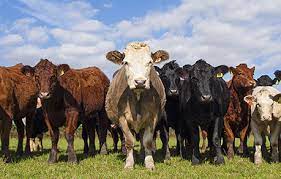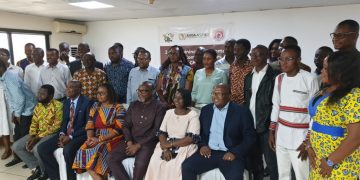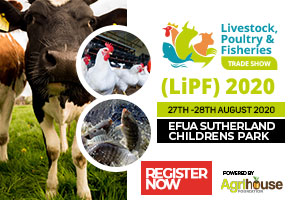|
Getting your Trinity Audio player ready...
|
ADVERTISEMENT
In these times more than ever, these dire challenges have intensified as a result of the COVID-19 pandemic, hitting especially, small-scale women farmers in the country the hardest, according to findings gathered by Agrihouse Foundation, through recent research.
At the height of the pandemic last year, the situation created major challenges in the areas of production, processing, transport, sales, consumption, investment, trade and promotions— all in one way or another influencing the space of market connectivity and accessibility. It is with this background that Agrihouse Foundation interacted with over a thousand agri-women in different parts of the country; to come to a better understanding of how their challenges have intensified and the impact it is having on accessing market:
Transportation: A 44-year-old chief district farmer from the Sekyere Central District, in the Ashanti Region, Madam Ohemaa Akyaa representing about 1,700 women in cocoa and maize farming, noted the COVID-19 spread has affected their transportation system, and now causing them to sell produce at no cost at all, to avoid losses. The situation has also affected the accessibility of inputs for farming. Already, they have been facing challenges of little or no access to finance to farming, and it is affecting their entire livelihoods.
Innovative Marketing Approaches: Aunty Ekua Atta, 57 years, also representing a select group of about 870 women farmers in mixed cropping in the Gomoa West District Assembly, emphasized an increasing need for support in training on new markets accessibility approaches and innovative ways of selling. She said her women also needed training in leadership and financial management, training on modern technology, best practices, cooperative structure development, mentorship and training in maintaining food production in crisis.
Education: Also, Madam Asabea, 62 years, representing 647 women cooperative in cocoa and cashew in the Goaso Municipal and Ahafo region, shared the challenges family farmers are facing since the lockdown of schools, which has brought school-feeding to a halt. She highlighted the need for more education on social distancing for farmers during this crisis and provision of PPEs, capital for production and farming inputs.
Skills Training For Self Reliance: Again, about thirty-two (32) young female student Agronomists and agripreneurs, currently unemployed, spoke of the challenges they are facing to afford a day’s meal and the call for skilled training to support and be useful to their communities, during this time of crisis.
Limited Access to Market: About 500 women Smallholder farmers and processors (the majority in rice parboiling, shea, baobab and Neem) from Bolgatanga, Wa, Tamale and the Brong Ahafo regions of Ghana have always expressed the need for assistance to access ready markets indicating the challenge is not limited to a particular geographical location.
Agri-Projects Powered by Agrihouse to Support Market Accessibility
In the face of these concerns, Agrihouse Foundation continues to design and implement agri-focused interventional projects and events that seek to address the above challenges that confront our Ghanaian men and women farmers and agri-processors.
Livestock Poultry & Fisheries Trade Show (LiPF): The tradeshow aims to ensure that all facets of the agricultural sector, including animal agricultural production, receive equal attention and resources. The annual event offers participants the opportunity to exhibit and market their products and services, engage in panel discussions and dialogues and go through training sessions, such as Livestock Training Session • Piggery Training Session• Rabbit Training Session • Cattle Training Session • Fisheries & Aquaculture Training Session • Grasscutters Training Session • Snail Training Session. This year, the 3rd edition of the event was on the theme, “We Move! W)n Yaa,” in partnership with the United State Department of Agriculture (UNDA) – Ghana Poultry Project (GPP), Ministry of Food and Agriculture (MOFA), and National Farmers and Fishermen Award Winner’s Association of Ghana (NFFAWAG). Since the first edition, LiPF has engaged over 50,000 sub holder farmers with a significant percentage of them expressing interest in animal agriculture. Feedback received from the previous editions reveal that 87% of participants are very impressed with the event and want more training in poultry, piggery, rabbit, cattle, and piggery farm; 90% say that LiPF is a perfect introductory training platform for people who want to venture in animal agricultural production.
Women in Food and Agricultural Leadership Forum (WOFAGRIC) and Gold in the Soil Awards: this project was established in 2019 by Agrihouse foundation to enable women develop their agricultural skills, motivate, mentor and build upon their capabilities to becoming independent. WOFAGRIC over the past years has helped shape and build more agri-women in the various regions across Ghana and has greatly been a source of women empowerment. The two-face project annually acknowledges the accomplishments of women farmers through the Gold in the Soil Awards, which seeks to celebrate and tell the impactful stories of the women in a documentary produced by Agrihouse. As part of its impacts, in 2019, almost a quarter of the nominees for the Gold in the Soil Awards made entries into the National Best Farmers Award Scheme at district, regional and national levels with about 7 of them winning laurels at the district and regional levels whist 2 of them picked up awards at the National awards.
In addition, attendees received training on proper management and bookkeeping. A follow up evaluation carried out 3 months after the event revealed some of these women have now been able to access loan facilities to support their farms and businesses. This year the Gold in the Soil Awards received 131 nominations from both Upper East and Upper West Region. Out of the number, 45 women were shortlisted and 14 awarded. A special Gold in the Soil award went to Canada as a development partner. Equally significant, the awards shined light on young women farmers and women farmers with disability. Twenty-three years old Mavis Alahire Aboko, and twenty-one year old Genevive Akugu, are two of such young ladies who won Star Woman Agripreneur Award and Feed to Foods Award, respectively. Alima Wahabu and Aberiga Yesara, both physically challenged women farmers were nominated for the Gold in the soil Awards this year, under the ‘Super Woman Farmer Award’ category.
The third WOFAGRIC and Gold in the soil Award was in partnership with Canadian High Commission, ABSA Ghana and YARA, INTERPLAST, OCP AFRICA, PEG AFRICA, LUMINANT ELECTRICALS AND RDF GHANA. Collaborating Institution included, the Ministry of Food and Agriculture (MOFA), Women in Agriculture Development (WIAD) and the National Farmers and Fishermen Award Winners Association (NFFAWAG).
Agri-Woman Marketplace: Agri-Woman Market Place is an interventional project, fully sponsored by Agrihouse Foundation, to support Ghanaian woman farmer, processer, packager, and marketer, IT service providers, among others, working within the agric value chain to market their services and products with convenience, both online and directly, in cleaner, safer spaces. Since its inception in March this year, the event has been taking place on the first Friday of every month at the forecourt of Agrihouse Foundation offices, in Dzorwulu. For the fifth edition which took place last week, thirty-Two (32) women farmers, processors, aggregators, agric input dealers, packagers, and other value chain actors participated. They exhibited products ranging from vegetables, ground paste, shea butter, Moringa, neem, coconut, castor oils, whiles the rest were into IT, finance, communications and marketing services. In the month of September, the Foundation intends to use the event to commemorate the ‘International Day of Awareness of Food Loss and Waste,’ which annually celebrated globally to highlight the critical need to reduce food loss and wastage around the world.
11th Annual Pre-harvest Agribusiness and Exhibitions slated for October
Pre-Harvest Agribusiness Conference and Exhibitions: The Pre-harvest Agribusiness Conference and Exhibitions is the only project that was handed down to Agrihouse Foundation by USAID, as part of the organizations exiting strategy. The event has become one of the leading and highly impactful interventional market linkage events on the Ghanaian Agribusiness calendar, providing long-term market development opportunities for farmers and agribusinesses.
The award-winning market-linkage platform promotes business partnerships among value chain actors, especially farmers, buyers, processors, government, Development partners, transporters, input dealers, civil society, equipment dealers, financial institutions, telecom companies and policy makers. Preharvest culminates with conferencing events, presentations, exhibitions and market place for business-to-business meeting. It also serves as a dynamic platform for farmers to negotiate and seal contracts, and seeks to strengthen the capacity of Farmer Based Organizations (FBO’s), Aggregators, Processors and value chain actors for them to play a key role as agricultural market actors. It further assists farmers and agribusinesses to expand their businesses before and after harvesting.
This year the event is scheduled for Tuesday, October 19th to Thursday, October 21. The edition, which is on theme “Working Together to Improve Market Channels for Agri-foods Beyond the Pandemic,” will take place at the Aliu Mahama Sports Stadium, in Tamale in the Northern region.
The three (3) days leading Agribusiness market linkage conference and exhibitions event, will as part of the Training and Capacity session, highlight and address the a challenges the COVID-19 pandemic has intensified within the sector, the effects it has posed on marketing Agri-foods, while exploring existing market channels to address these challenges.
A key highlight of the 3-day event will be the Field demonstrations, where farmers and actors get to practically learn, appreciate and adopt best practices in Farm Management. This will take place at the Agrihouse Foundation AGRI-VILLAGE, a Ten (10) acre land, donated by the Bamvim Lana (Chief of Bamvim). It is expected that, Companies leading various Training sessions, will setup mini-demonstration fields for a more engaging practical session.
In the short to long term, the Agrihouse Foundation Agri-village is expected to house different type of farms (including seeds and Livestock Farms), Demonstration Centers, Conference / Workshop halls, Restrooms, Exhibition stores for Agric Companies, Training and Recreational Centers, Storage space, Processing centers, Production room, Laboratories and Research Centers.
In a release, the Executive Director of Agrihouse Foundation, Alberta Nana Akyaa Akosa, has noted that, “the Pre-harvest event, over the past (10) years, has created and connected, through exhibitions, companies that are into fertilizers, seeds, Irrigation, machinery and equipment, Finance, Transportation, ICT, Processors, Packagers, Marketers, Government Institutions, Development Partners, among others. Over 90% of companies and participants have been linked to markets through the Exhibitions, which runs throughout the 3-day event.
She said, in 2020 (the 10th edition), the event recorded a total of 3,122 participants, and one hundred and twenty-two (122), companies registered and participated in the Exhibitions. And even now, “as the Country is opening up, amidst the COVID-19 pandemic and from current trends and the on-going registration process, we are positive, a good number of Companies, will sign –up to showcase their products and services. This year’s Pre-Harvest event will not come short in playing its role in facilitating farmers and agro-processors to access opportunities to expand their growth potentials and build new partnerships. We have a strong team with the capacity to ensure that,” she said.
Pre-harvest has become a leading event on the Ghanaian agricultural calendar and has served as a stimulating platform for training, and for creating increased stakeholder linkages, exhibitions and expanded opportunities. It operates from a facilitative dimension by presenting a highly engaging and coordinated platform that ensures that smallholder farmers are linked to markets, finance, inputs, equipment, and information through larger commercial farmers and traders who have the capacity and incentive to invest in smallholder production. The three (3) day event will therefore feature activities such as; training, panel and open discussions, field demonstrations, keynotes and Exhibitions, while displaying, promoting business and networking opportunities through the conference that would run alongside the event.
“These activities are geared towards capturing the marketing challenges faced by the actors especially in the pandemic and how other modernized marketing platforms can serve as a solution to maximize the output of the actors along the value chain. Farmers, actors along the value chain and participants will be equipped with the necessary knowledge and skills to observe Good Agricultural Practices,” Ms. Akosa added.
A Call for More Corporate Support
Calling for more partnership and support for the event, Ms. Akosa said the event will make room, for a farmer-buyer platform, where farmers of various commodities, including Maize, rice, millet, sorghum, soyabeans, cowpea, cashew, shea, etc, meet, negotiate and sign supply deals with buyers. It is therefore a great marketing and promotions platform for cooperate organizations and investors to be associated with, as among other substantial benefits, they will have direct access to direct market, feedback from customers and potential ones, as well as thousands of database of farmer groups and agribusinesses that will be at the Pre-harvest event.
































































